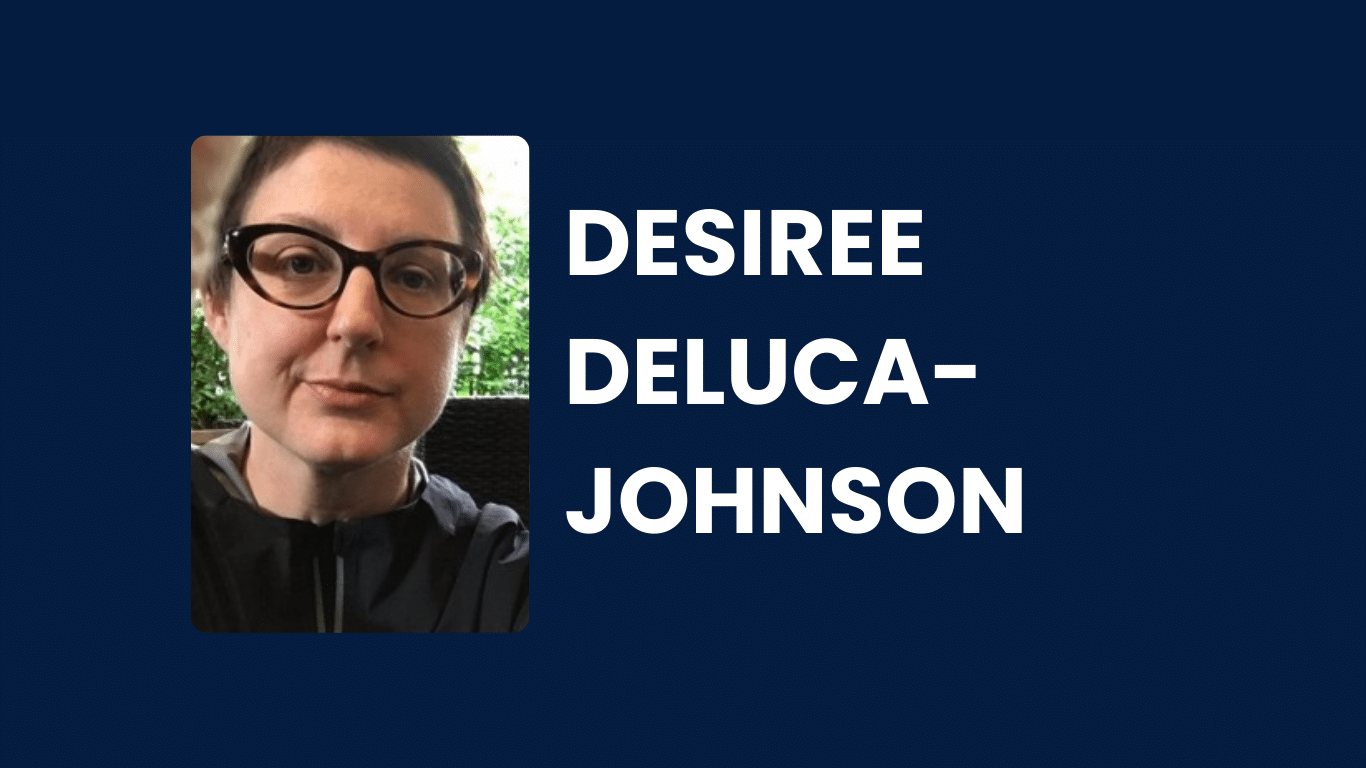Desiree DeLuca-Johnson, Breast Cancer Clinical Trial Participant
By ciscrp1|Nov 23, 2024
By ciscrp1|Nov 23, 2024

Diagnosed with Breast Cancer
“I am a lawyer, my husband is a pathologist, and I had no idea that there were hospitals that just treated cancer,” says Desiree De Luca-Johnson, an attorney, breast cancer survivor and patient advocate.
At the age of 40, just when she was ready to go back to work after staying home with her young children, Desiree was diagnosed with breast cancer.
Desiree’s road to being a clinical trial participant is reflective of her legal training. “I made a plan. I had a white board. I decided that if ‘A’ happens, then we would move on to ‘B’. I’m passionate about clinical trials.”
Desiree was diagnosed while living in a military community in Virginia, and her husband was deployed. “I was exhausted, and literally crawling upstairs to put my kids to bed,” Desiree recalls. Her oncologist at the time was a military physician and the treatment plan recommended for Desiree was conservative in nature. She was not told about clinical research as a healthcare option.
Finding a Clinical Trial
“I got 200 pages of where I could get free makeup and wigs, and not one page on clinical trials,” says Desiree. “I discovered that oncologists have different attitudes about treating cancer and I wish someone had told me about this. My oncologist was not aggressive about different treatment options.” Desiree recalls she was willing to deal with a higher level of side effects when her doctor told her she had an 80%/20% chance of survival.
“I was suicidal because of the anxiety. I found out (in addition to the breast cancer), I had a benign brain tumor,” says Desiree.
When she posed a question about clinical trials, Desiree’s doctor told her she was not sick enough to be in a clinical trial.
Desiree’s background as an attorney had honed her research and investigative skills. She decided to take definitive action.
“I made lists of cancer hospitals. I investigated their websites. I learned about ClinicalTrials.gov, which is a hard website to navigate. My husband was opposed to me doing a clinical trial, so I was doing this research all alone. But it was keeping me alive,” says Desiree. (Desiree’s husband ultimately embraced her decision to participate in clinical trials).
“After 40 or 50 hours of work, I found BreastCancerTrials.org, where I found 6 clinical trials I might be eligible for. We have a saying in the law. When you’re repeating your results, you have done your research. I was ready to apply to clinical trials,” says Desiree.
Her oncologist in Virginia was not supportive of Desiree’s decision, and voiced a level of concern about clinical trial participation. Undeterred, Desiree pursued clinical research options and other avenues for her health and wellness.
“The most important thing about choosing to enroll in a clinical trial, for me, were childcare and the affiliated travel costs,” says Desiree. “I became my own doctor, in a sense. I read that doing yoga was good when you have cancer, so I did yoga. I read that exercise was good, so I hired a health coach,” says Desiree.
And, she participated in clinical trials. “I did an early-stage trial,” says Desiree. “The big barrier, again, was childcare. The navy has a program so my husband didn’t have to deploy during my treatment, so he could take care of our children.”
Desiree’s sister, who lives in Boston, recommended looking at Massachusetts General Hospital for relevant clinical trials to join. Desiree enrolled in a one-year treatment clinical trial. At the end of this clinical study, it was deemed a negative trial, meaning that the results demonstrated that the new treatment was inferior to standard treatment. (1) Overall, the experience was still a positive one for Desiree.
“I felt safer in a clinical trial because I had a better relationship with my research oncologist and oncology nurse in Boston. We were all up to date on the same research,” says Desiree.
“I was grateful to be at a top research hospital. I was able to feel safe for a year – it gave me some time to breathe and research my options.”
“Through my clinical trial participation, I got access to other treatments for other conditions, such as bone density, and I was able to access other clinical trials,” says Desiree. Her research oncologist became her primary oncologist.
“Now I am in a trial to monitor for re-occurrence and I can make an action plan for quality of life,” says Desiree.
“Before participating in clinical research, every single day my first thought was, how will I know if my cancer has returned? Now I wake up and feel free,” says Desiree.
Desiree and her children have relocated to her home state of Vermont, in order to be closer to Massachusetts General Hospital, the clinical trial and family. “The relationships really matter,” says Desiree.
Desirae’s clinical research journey has brought her full circle, professionally. She currently works full-time at BreastCancerTrials.org as Outreach and Operations Manager.
Desiree advises people considering clinical research that, “When it comes to your oncologist, it’s a fiduciary relationship. It was my job to know the consequences of the decisions I was making to help them reach their goals.
You have to be your own best advocate. No one is going to care as much about your life as you do.”